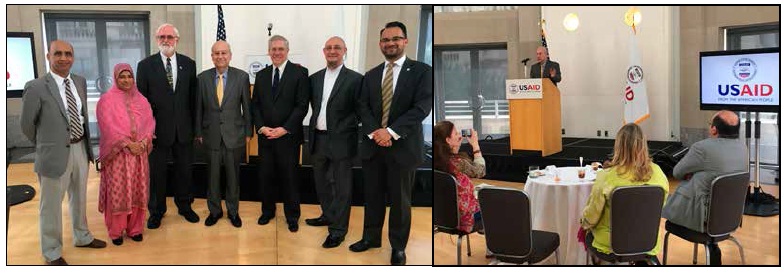On the Urgency of Peace Education
By Shadab Zeest Hashmi
San Diego, CA


At a time when the most optimistic and energetic of peace activists are feeling browbeaten, and at a loss for direction, the need for leadership in establishing dialogue, and more importantly, in teaching communities how to build dialogue, is a desperate one.
As a hermetic writer, I take comfort from reading the works of great thinkers who have given us incisive views on why conflict occurs and what, if any, solutions exist. But the present historical moment allows us neither the luxury of solitary contemplation, nor a preoccupation with communing exclusively with the like-minded. We are witnessing an epic feud between globalism and tribalism, manifested and constantly compounded in incendiary differences; a polarization that translates into extreme prejudice and hatred among communities (of various racial, religious, sectarian and political affiliations) across the world. Building bridges has become a matter of life and death.
On my recent visit to Washington DC, I attended an Eid breakfast at USAID, the first ever Eid event by the eminent organization where Ambassador Akbar Ahmed had been asked to deliver the keynote address to an audience of top ambassadors, executives of humanitarian organizations and think tanks, academics and activists.
Eid, which concludes the month of Ramadan, is meant to be a time of festivity, but this year the customary celebration is eclipsed by overwhelming grief and uncertainty in response to numerous large-scale terrorist attacks as well as the rising trend of violent Islamophobia. There is a general sense of feeling isolated and insecure, particularly among the American Muslim community.
Many of us, Muslim or not, are in need of a sanctuary against unceasing tensions— a sanctuary made of articulation in a time of silencing, chaos, tragedy, and loss of hope. In his speech, Dr Ahmed offered that sanctuary— highlighting shared values, shared histories, and a common purpose, in a manner only possible when words are informed by the rare combination of extensive knowledge, experience in lucid, meaningful dialogue, and an unwavering commitment to peace.
As a literary writer who identifies as Muslim and is drawn into interfaith discourse by default, I find there is much to learn from Dr Ahmed’s approach. He is invested in asking genuine questions— not only of thinkers, leaders, and academics, but ordinary people (those who make up the energies behind both conflict and cooperation), offering conversations that illuminate personal stories, an approach that is aimed at creating an authentic, permanent culture of mutual understanding, not merely an attempt at erasing present misconceptions.
This approach reflects in the work of his daughter, Dr Amineh Hoti as well. I was truly happy to attend her talk at Georgetown University, and to learn of her initiative to teach an inter-disciplinary course that coins an original language of bridge-building, recognizing and respecting diversity, and emphasizing the need to contribute to a peaceful coexistence. Her course, originally conceived and taught at Cambridge University by her, is offered on multiple campuses across Pakistan. “Teaching Acceptance,” the textbook she has authored, is remarkable in its scope, and a must-read for anyone interested in Peace-education.
Talking to Dr Akbar Ahmed and Dr Amineh Hoti about a massive interfaith project called “Islam in Europe,” (that they are completing, along with a team of brilliant students at American University), I was struck by their stamina, patience with the opposing viewpoints they encounter, sense of humor, and range of knowledge. Being scholars, they work with esoteric materials, but are constantly and quite successfully engaged in translating concepts that are academic, historical, religious, and social, across various cultures and generations. They offer to show us the mirror by hearing us out, gently helping us to see the irrationality of our own prejudices, the possibility of a less toxic, healthier future.
In today’s world of fear, bigotry, and willful ignorance, this work is as daunting as it is crucial; it urgently requires a measure of courage and participation from each of us. I am reminded of the thirteenth century Sufi poet and polymath Amir Khusrao, who was a celebrated court poet, chronicler, and inventor, and longed, at times, to give up court life in favor of the mystic life with the beloved saint Nizam Uddin Aulia, but the saint insisted that building bridges of understanding and cultivating compassion, was a supreme service and the noblest use of knowledge and creativity. At the moment, being in the service of bridge-building is more than a noble act, it is a matter of our collective survival.
( Shadab Zeest Hashmi is the author of the collections Baker of Tarifa and Kohl & Chalk, and the w inner of the San Diego Book Award and the Nazim Hikmet Poetry Prize. An American poet of Pakistani origin, her work has been translated into Spanish and Urdu, and her poems and essays have appeared in journals and anthologies worldwide)

